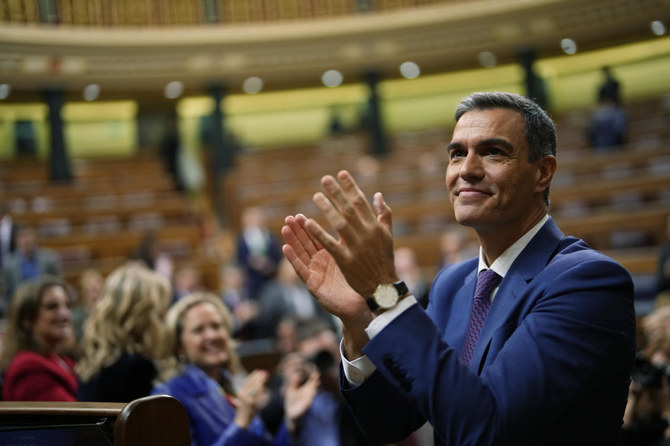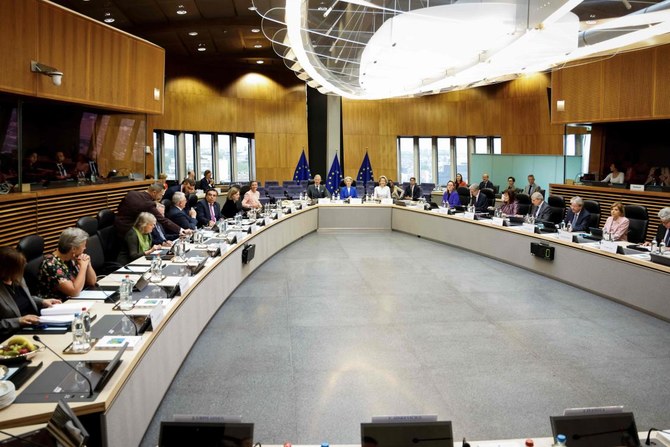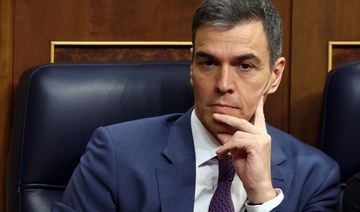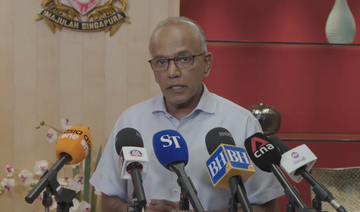MADRID: Spain’s Prime Minister Pedro Sanchez said on Monday he had decided to continue in office, days after abruptly announcing he was considering his future following the launch of a corruption investigation against his wife.
The center-left prime minister, 52, had surprised foes and allies alike when he said on Wednesday he was taking time from public duty to consider quitting. He described the court investigation of his wife Begona Gomez for influence peddling and business corruption as orchestrated by his opponents.
Sanchez met King Felipe VI on Monday — a step that would have been necessary should he have decided to resign — but announced in a televised address that he had informed the monarch of his decision to stay on. He had been encouraged to stay by widespread expressions of support over the weekend, Sanchez said.
“I have decided to go on, if possible even stronger as prime minister. This is not business as usual, things are going to be different,” he said in a national broadcast.
His announcement that he might quit had caused further turmoil in Spanish politics, where a fractious parliament has struggled to form coalition governments after close elections. Should a new election have been required, it would have been the fourth in five years.
The opposition will try to exploit the sign of indecision from Sanchez, but the impact may be limited because Spain’s political landscape is already so polarized, said Ignacio Jurado, political science professor at Madrid’s Carlos III University.
“His credibility is already hotly contested and voters have already given it to him or taken it away,” he said. “As a leader he has shown a weakness and it’s something that the opposition will exploit a lot.”
Pedro Sanchez stays on as Spain’s prime minister after weighing exit
https://arab.news/4f3uc
Pedro Sanchez stays on as Spain’s prime minister after weighing exit

- Sanchez had surprised foes and allies when earlier said he considers quitting
- He described the court investigation of his wife Begona Gomez for influence peddling and business corruption as orchestrated by his opponents
What to expect as new, guitar-playing PM takes helm in Singapore

- Lawrence Wong went viral for his guitar cover of Taylor Swift’s ‘Love Story’ in March
- Best chapters of our Singapore story lie ahead, new PM said in inaugural speech
SINGAPORE: As Singapore gets a new prime minister for the first time in 20 years, experts have told Arab News what to expect from the city-state’s fourth leader, Lawrence Wong, who came to the fore with his handling of the successful COVID-19 response.
Wong was inaugurated on Wednesday evening, taking over the reins from Lee Hsien Loong, son of the founding father of modern Singapore Lee Kuan Yew.
The 51-year-old began his career as an economist at the trade ministry with a US educational background, before moving up to occupy some of the biggest jobs in Singapore’s bureaucracy, including the Energy Market Authority and Lee’s principal private secretary.
The civil servant-turned-politician was catapulted into the spotlight in 2020, when he coordinated Singapore’s successful fight against COVID-19. He has also garnered public support by showcasing his guitar skills online, including a cover of Taylor Swift’s “Love Story” that went viral in March.
“Lawrence Wong has been in charge with the COVID-19 pandemic, and he did very well. Singapore did very well by and large; that was something that the international community noticed,” said James M. Dorsey, a senior fellow at the Nanyang Technological University.
Compared with Lee, Wong will still have to work on his global exposure, but should be able to capitalize on the enduring image of Singapore’s “serious stability,” Dorsey added.
“As we watch the process of build-up toward the transition, we will have greater confidence in Lawrence Wong. And simply the confidence in the way Singapore does things, working in Wong’s favor.”
Southeast Asia analyst Adib Zalkapli is expecting Wong to continue the policies of his predecessor, who oversaw the country’s economic growth into an international financial hub and top tourist destination, more than doubling the island’s gross domestic product per capita.
“It’s a well-planned change of leadership that will ensure continuity. We are unlikely to see major policy changes in the short to medium term,” he told Arab News, adding that the same approach will likely apply on matters related to foreign policy.
Bridget Welsh, an honorary research associate at the Asia Research Institute in the University of Nottingham Malaysia, is also expecting continuity.
“Essentially status quo. Arguably, there will be more engagement, as issues remain complex in the region, and the new leadership will want to establish or deepen his own personal ties in the region,” Welsh said.
But so far, little is known about the policies Wong is likely to adopt, said Ian Chong, an associate professor of political science at the National University of Singapore.
“Lawrence Wong has said that he will bring continuity, make tough decisions, and is pro-Singapore. What these mean in practice is not yet known. Wong has not so far stated what his policy direction and vision is, why it is important, and why Singaporeans need to support it,” he said.
The new prime minister arrives at a particularly challenging time in geopolitics, a departure from a period of “stable external environment” that worked in Singapore’s favor.
“Intensifying US-PRC (People’s Republic of China) competition, internal circulation, on-shoring, friend-shoring, trade barriers, as well as data and technology in all the developed economies challenge Singapore’s business model,” Chong said.
“Wong has yet to articulate a plan on how he intends to deal with these challenges, even though he concedes their seriousness.”
In his first speech as prime minister, Wong paid tribute to his predecessors, but said that the country’s new leadership would adopt a style that “differs” from that of previous generations.
“We will lead in our own way. We will continue to think boldly and to think far. We know that there is still much more to do,” he said. “The best chapters of our Singapore story lie ahead.”
Outrage grows in India over UN staffer killed by Israeli forces in Gaza

- Army veteran Waibhav Anil Kale was working for UN Department of Safety and Security
- More than 190 UN staff killed since beginning of Israel’s onslaught on Gaza last year
NEW DELHI: The killing of an Indian army veteran serving as a UN staffer in Gaza has stirred outrage in India and calls for the government to hold Israel accountable, with activists calling New Delhi’s reaction ‘inadequate.’
Col. Waibhav Anil Kale, a former peacekeeper, was on duty with the UN Department of Safety and Security when his UN-marked vehicle was hit on Monday en route to the European Hospital in Rafah by what the international organization said was Israeli tank fire.
The Indian government’s response was a condolence statement issued on Wednesday by the Ministry of External Affairs, saying it was “deeply saddened by the death” and “in touch with relevant authorities” regarding an investigation.
The statement did not issue a condemnation, unlike in July 2022, when two Indian peacekeepers were killed in an attack on a UN Organization Stabilization Mission base in the Democratic Republic of the Congo. At that time, India’s foreign minister said the perpetrators “must be held accountable and brought to justice” and convened a special meeting of the UN Security Council to discuss the attack.
Talmiz Ahmad, former Indian ambassador to Saudi Arabia, said the government’s response was “grossly inadequate” given what he called the “calculated killing” of an Indian army officer and UN staffer.
“The Indian government can hold Israel accountable. India is a sponsor of a resolution related to the protection of the UN personnel,” he told Arab News.
“This particular killing of a UN officer is a targeted killing because it was very obvious to Israelis that this was a UN vehicle, and it was on an official UN mission. A tank deliberately targeted this vehicle.”
New Delhi had always been sensitive to assaults on UN personnel given that it is one of the largest contributors to the organization’s peacekeepers.
The reaction to Kale’s killing was insufficient, according to Kavita Krishnan, a women’s rights activist.
“If a person is a UN employee, he is entitled to protection,” she said. “The Indian government should specifically hold Israel accountable for this killing. They cannot treat it just as a casualty of war or a collateral damage.”
“IT’S NOT A DEATH”
Since October last year, Israel’s deadly siege and bombardment of Gaza has killed more than 35,000 people, wounded 70,000, and left most of the enclave’s population starving and with no access to medical, food and water supplies.
The UN estimates that more than 190 of its staff members have also been killed in the ongoing onslaught. Kale was the first international UN employee to be killed.
“It’s condemnable that India does not name the fact of assassination. It’s not death. He did not die of illness. He was killed by Israel,” said Apoorvanand Jha, a public intellectual and professor at the University of Delhi.
“Israel kills people who are involved in the health services ... kills journalists, aid workers and kills workers involved in the peacekeeping forces. So, it does it knowingly. It is not a collateral damage. Israel does it knowingly — this is what has been recorded many times. Israel needs to be held accountable for all the individual crimes of assassinations and the collective crimes, mass deaths.”
From a legal point of view, the killing of UN personnel is against norms and customs of international law and international humanitarian law.
“New Delhi should tell Tel Aviv that it should respect international law,” said Anwar Sadat, a senior assistant professor at the Indian Society of International Law.
“The Indian government should issue a diplomatic demarche to the Israeli government.”
Since the beginning of its invasion of Gaza, Israel has revoked work permits for tens of thousands of Palestinian laborers and sought to facilitate their replacement with manpower from South Asia.
In November, the Indian government signed a three-year agreement with Tel Aviv on the “temporary employment” of workers in the construction and caregiving sector.
“If this is the statement that the Indian government can bring for an official who works with the UN, imagine what if it happens with any of the workers. No one is going to speak,” said N. Sai Balaji, assistant professor at Jawaharlal Nehru University.
“This seriously compromises India’s super-power ambitions, it seriously compromises India’s own foreign policy.”
15 EU states demand plan to send asylum seekers to third countries

- The letter asks the European Union’s executive arm to “propose new ways and solutions to prevent irregular migration to Europe.”
- EU law stipulates that people arriving in the bloc without documents can be sent to a third country
COPENHAGEN: Fifteen EU states have demanded a further tightening of the bloc’s asylum policy, making it easier to transfer undocumented migrants to third countries, including when they are rescued at sea.
The demand, sent in a letter to the European Commission that AFP received on Thursday, comes less than a month before European Parliament elections, in which far-right anti-immigration parties are forecast to make gains.
The letter asks the European Union’s executive arm to “propose new ways and solutions to prevent irregular migration to Europe.”
The group includes Italy and Greece, which receive a substantial number of the people making the perilous journey across the Mediterranean Sea to reach the EU — many seeking to escape poverty, war or persecution, according to the International Organization for Migration.
They want the EU to toughen up its recently adopted asylum pact, which introduces tighter controls on those seeking to enter the 27-nation bloc.
That reform includes speedier vetting of people arriving without documents, new border detention centers and faster deportation for rejected asylum applicants.
The 15 proposed in their letter the introduction of “mechanisms... aimed at detecting, intercepting — or in cases of distress, rescuing — migrants on the high seas and bringing them to a predetermined place of safety in a partner country outside the EU, where durable solutions for those migrants could be found.”
They said it should be easier to send asylum seekers to third countries while their requests for protection are assessed.
They cited the example of a controversial deal that Italy has struck with non-EU Albania, under which Rome can send thousands of asylum seekers plucked from Italian waters to holding camps in the Balkan country until their cases are processed.
The concept in EU asylum law of what constitutes “safe third countries” should be reassessed, they continued.
EU law stipulates that people arriving in the bloc without documents can be sent to a third country, where they could have requested asylum — so long as that country is deemed safe and the applicant has a genuine link with it.
That would exclude schemes like the divisive law passed by the UK, which has now left the EU, enabling London to refuse all irregular arrivals the right to request asylum and send them to Rwanda.
Rights groups accuse the African country — ruled with an iron fist by President Paul Kagame since the end of the 1994 genocide that killed around 800,000 people — of cracking down on free speech and political opposition.
The 15 nations said they wanted the EU to make deals with third countries along the main migration routes, citing the example of the arrangement it made with Turkiye in 2016 to take in Syrian refugees from the war in their home country.
The letter was signed by Austria, Bulgaria, Cyprus, the Czech Republic, Denmark, Finland, Estonia, Greece, Italy, Latvia, Lithuania, Malta, the Netherlands, Poland and Romania.
It was not signed by Hungary, whose Prime Minister Viktor Orban has resisted EU plans to share out responsibility across the bloc for hosting asylum seekers, or to contribute to the costs of that plan.
German police raid properties as pro-Palestinian group banned

- Palestine Solidarity Duisburg had repeatedly propagated its anti-Israeli and antisemitic worldview, at meetings and on social media channels goverment claimed
BERLIN: German authorities banned a pro-Palestinian group on Thursday for its alleged support of Hamas and police raided properties to confiscate devices and documents, the interior minister of North-Rhine Westphalia said.
Herbert Reul said the group, Palestine Solidarity Duisburg, had repeatedly propagated “its anti-Israeli and antisemitic worldview, at meetings and on social media channels.”
Some 50 police officers searched the properties in the northwestern state, confiscating laptops, cash, cell phones and documents, he said in a statement.
Palestine Solidarity Duisburg was not immediately available for comment.
The group had been known to the authorities since May 2023, the minister said. It organized a rally in front of German arms maker Rheinmetall’s headquarters, protesting the delivery of weapons to Israel, which is fighting Hamas in Gaza.
The German government last year imposed a complete ban on the activities of Palestinian militant group Hamas, already a designated terrorist organization in the country.
North-Rhine Westphalia’s Office for the Protection of the Constitution recommended the ban on Palestine Solidarity Duisburg, Reul said.
Afghan asylum-seeker in UK still wearing ankle tag months after it was deemed unlawful

- Man identified as MM had GPS anklet affixed as part of Home Office pilot scheme
- MM: ‘People in my community do not understand why I have been tagged. They think I am a dangerous criminal’
LONDON: An Afghan asylum-seeker in the UK has been left wearing an ankle tag months after the pilot scheme he was part of was ended for being unlawful.
The man, identified as MM, revealed he has been made to wear the tag monitoring his location for 20 months and has been given no explanation why, which has left him in a state of “constant stress.”
The GPS tag, part of a Home Office pilot scheme to monitor the locations of 600 migrants, was put on in 2022 after MM spent 60 days in a detention center, having arrived in the UK via a small boat across the English Channel.
The Home Office insisted the tags of all the scheme’s participants were removed when it ended in December after the UK Information Commissioner John Edwards declared it breached data protection law and was “highly intrusive.”
MM, though, was left with his still attached and was provided no explanation from the Home Office as to why.
“Being fitted with this tag has been a constant stress for more than a year and a half. I struggled with sleep because I had to keep the tag charged at all times, including at night, but it would often beep and wake me up,” he said.
“I have had security guards following me like I’m a thief when I go shopping. People in my community do not understand why I have been tagged. They think I am a dangerous criminal. There is physical pain too — it caused a wound that keeps opening up and bleeding.
“It has really affected all parts of my life.”
He continued: “If the law is applied equally, I do not understand why I was fitted with a tag but others were not. Nobody else in the hotel I stayed in had a tag.
“I don’t understand why this injustice has happened. I do not understand why the Home Office needed to monitor everywhere I went and everything I was doing. This was not explained to me at all.”
Niamh Grahame, a solicitor at the Public Law Project, which represented MM, said: “Our client has been subject to a harmful and unnecessary experiment. There is mounting evidence of the harm caused by GPS tagging and incredibly limited evidence of asylum-seekers absconding in significant numbers.
“GPS tagging is an inhumane and disproportionately invasive bail condition. Instead of expanding its use, the Home Office should stop this practice altogether.”
A Home Office spokesperson said: “All individuals who were subject to electronic monitoring as part of the Expansion Pilot, and remained in contact with us, had their tags removed before the pilot ended on Dec. 14, 2023.”




















